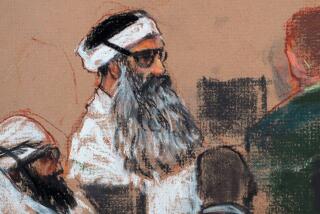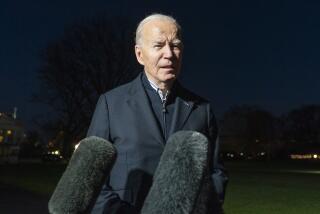Iraq decries U.S. raid on Syria village
- Share via
BAGHDAD — The Iraqi government Tuesday condemned a U.S. helicopter assault inside Syria over the weekend as Damascus shut down an American school and cultural center in reaction to the raid.
As the Iraqi government voiced displeasure over the American assault, the Cabinet also approved changes to a proposed U.S.-Iraq security agreement that would allow U.S. forces to stay in Iraq through the end of 2011.
The raid on Syria highlighted the tense relations between Iraq and its neighbors Iran and Syria, which vehemently oppose any long-term American presence in Iraq and want Baghdad to reject the agreement.
The changes recommended by the Cabinet include a demand to inspect U.S. military shipments into Iraq and the right to determine alone, without American involvement, whether any U.S. soldier suspected of committing a crime was off duty and should therefore stand trial in Iraqi court, according to Environment Minister Narmin Othman.
The Cabinet rejected a clause in the text that would have offered Iraq the option of asking U.S. forces to stay on after 2011 if the Iraqi government decided it still needed support.
The Iraqi demands, particularly regarding prosecuting U.S. soldiers in Iraqi court, were not likely to be approved by the Bush administration, which has described the current text as its best offer.
If American negotiators do not accept the changes, the Cabinet will decide whether to submit the agreement to parliament or to seek an alternative arrangement with the Americans after Dec. 31, when the current United Nations Security Council resolution authorizing U.S. forces in Iraq expires.
In an interview on the U.S.-funded Al Hurra television channel, government spokesman Ali Dabbagh said if the negotiations failed, the only other option was to go before the U.N. Security Council to seek an extension of the mandate for U.S. forces in Iraq. The Americans have warned the Iraqi government that if it has no bilateral pact or legal protection, the U.S. military will have to freeze most activities on Jan. 1, according to a senior U.S. officer.
Even as the Cabinet debated the proposed U.S.-Iraqi pact, Iraq made clear its displeasure over the U.S. strike on Syria after avoiding such criticism for almost two days. Dabbagh denounced the operation, in which U.S. helicopters flew five miles inside Syria to the village of Sukkariyeh to target a suspected facilitator of foreign fighters.
“The Iraqi government rejects the strike by the U.S. planes on Syrian territories as part of the policy of the Iraqi government and its constitution which does not allow the Iraqi land as a base to conduct such attacks on neighboring countries,” Dabbagh said in a statement. “The Iraqi government has initiated an investigation on this incident and called for the U.S. forces not to repeat such an act.”
The Iraqi parliament criticized the U.S. forces for launching the raid at a time when relations were improving with Iraq’s neighbor and vowed “its land will not be used to attack any state.”
In Damascus, Syria’s Cabinet condemned the assault on Sukkariyeh as “brutal, vicious American aggression.”
Syria’s official news agency reported that authorities had decided to shut down an unidentified Damascus-based “American school” and a cultural center. The report didn’t identify the school.
Syrian authorities have also postponed a meeting of a Syrian-Iraqi committee scheduled for Nov. 12 in Baghdad to improve relations between the two countries.
A senior U.S. official described the target in Sunday’s raid as Abu Ghadiyah, the chief of a Syrian smuggling network and one of the most prominent facilitators of moving foreign fighters into Iraq.
The raid came despite an apparent thaw in Syrian-Iraqi relations. Damascus this month sent its first ambassador to Iraq since the early 1980s. The number of foreign fighters crossing into Iraq has dropped in the last year from 100 to 20 a month, the U.S. says. And Gen. David H. Petraeus, the former top commander in Iraq and the chief commander for U.S. forces in the Middle East, had previously praised Syria for cracking down on fighters crossing into Iraq.
Meanwhile, an Iraqi criminal court in Baghdad sentenced an Iraqi man to death in connection with the June 2006 killing of three U.S. soldiers in Yousifiya, south of Baghdad, the U.S. military said in a statement. Two other Iraqi males were found not guilty, it added.
--
Times staff writers Borzou Daragahi in Beirut and Usama Redha, Caesar Ahmed and Saif Hameed in Baghdad contributed to this report.
More to Read
Sign up for Essential California
The most important California stories and recommendations in your inbox every morning.
You may occasionally receive promotional content from the Los Angeles Times.












